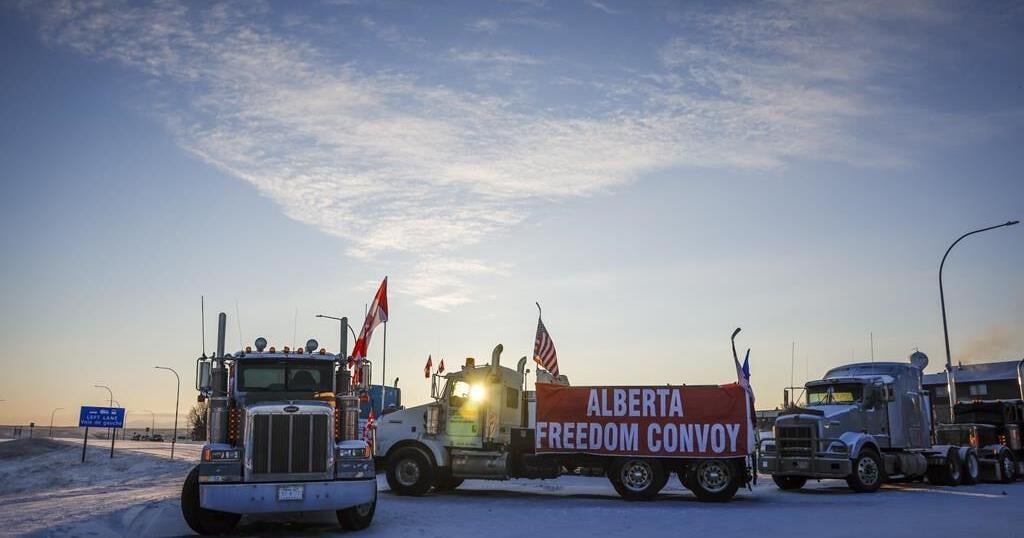LETHBRIDGE, Alta. – A Crown prosecutor says two men convicted of mischief and weapons offences at the 2022 border blockade at Coutts, Alta., should spend nine years in prison, but defence lawyers think their clients have already spent enough time behind bars.
Anthony Olienick and Chris Carbert were convicted earlier this month of public mischief over $5,000 and possessing a firearm dangerous to the public peace. Olienick was also convicted of possessing a pipe bomb.
A jury found them not guilty of the most serious charge they faced: conspiracy to murder police officers.
Crown prosecutor Steven Johnston told a sentencing hearing Thursday that the case isn’t about the right to protest government policy and that believing in a cause doesn’t excuse committing a crime.
“This case has never been, nor should it be, about the idea of what the cause was … was the cause good? That is not what this court should be weighing,” Johnston said.
“The relative goodness, (or) how hard you believe in your cause, does not excuse criminality.”
Johnston urged Justice David Labrenz to impose a 10-year weapons prohibition ban for Olienick and a lifetime ban for Carbert.
The blockade was one of several held across the country to protest COVID-19 rules and vaccine mandates.
Olienick and Carbert were charged after RCMP found guns, ammunition and body armour in trailers near the blockade at the key Canada-U. S. border crossing.
More guns, ammunition and two pipe bombs were located at Olienick’s home in Claresholm, Alta.
“Mr. Carbert and Mr. Olienick believed they were at war. They were prepared to die for their cause. The very real risk is that a firefight would have occurred,” Johnston said.
“These people were ready to have a firefight with the RCMP. It sounds like something we hope doesn’t happen in our country but the reality is it did and it happened in southern Alberta.”
Carbert’s lawyer, Katherin Beyak, said she’s not suggesting that what her client did wasn’t a dangerous situation but said there’s no guarantee there would have been a shootout with police.
“You’re sentencing on an if or possibility rather than an eventuality,” she said to the judge.
“We can’t presume for the purpose of sentencing that the worst-case scenario would have occurred.”
Beyak said Carbert’s moral culpability is at the lower end of the scale and that her client ended up at the protest due to isolation, spending too much time looking at conspiracy theories on the internet and getting angry about the COVID-19 restrictions.
Beyak said her client has been in jail for 929 days, which is nearly four years given the accepted valuation of granting extra credit for time served while awaiting trial.
Olienick’s lawyer, Marilyn Burns, said her client never had any intention of hurting the police. She said a nine-year sentence would be excessive and called for a total of six months in jail for the dangerous weapon charge, with an absolute discharge on the explosives one and community service on the mischief conviction.
“He’s had his time where it’s been very difficult the last two and a half years and I would suggest he’s learned his lesson,” Burns said.
Burns said Olienick acknowledges that he should “not drink tequila,” suggesting he believed it impaired his judgment when he unwittingly told undercover police officers at the barricade he had weapons and was ready to go to war with police.
Labrenz will deliver the sentences on Sept. 9.
The Crown in the case has already given notice it intends to appeal the not guilty verdicts given to the two men. A decision on whether it will actually proceed with the appeal won’t occur until after the case is reviewed and sentencing is over.
Two other protesters charged with conspiracy to commit murder at the blockade pleaded guilty earlier this year to lesser charges.
Christopher Lysak was sentenced to three years for possession of a restricted firearm in an unauthorized place. Jerry Morin was sentenced to 3 1/2 years for conspiracy to traffic firearms.
Those sentences amounted to time the men had served in pretrial custody.
This report by The Canadian Press was first published Aug. 29, 2024.
